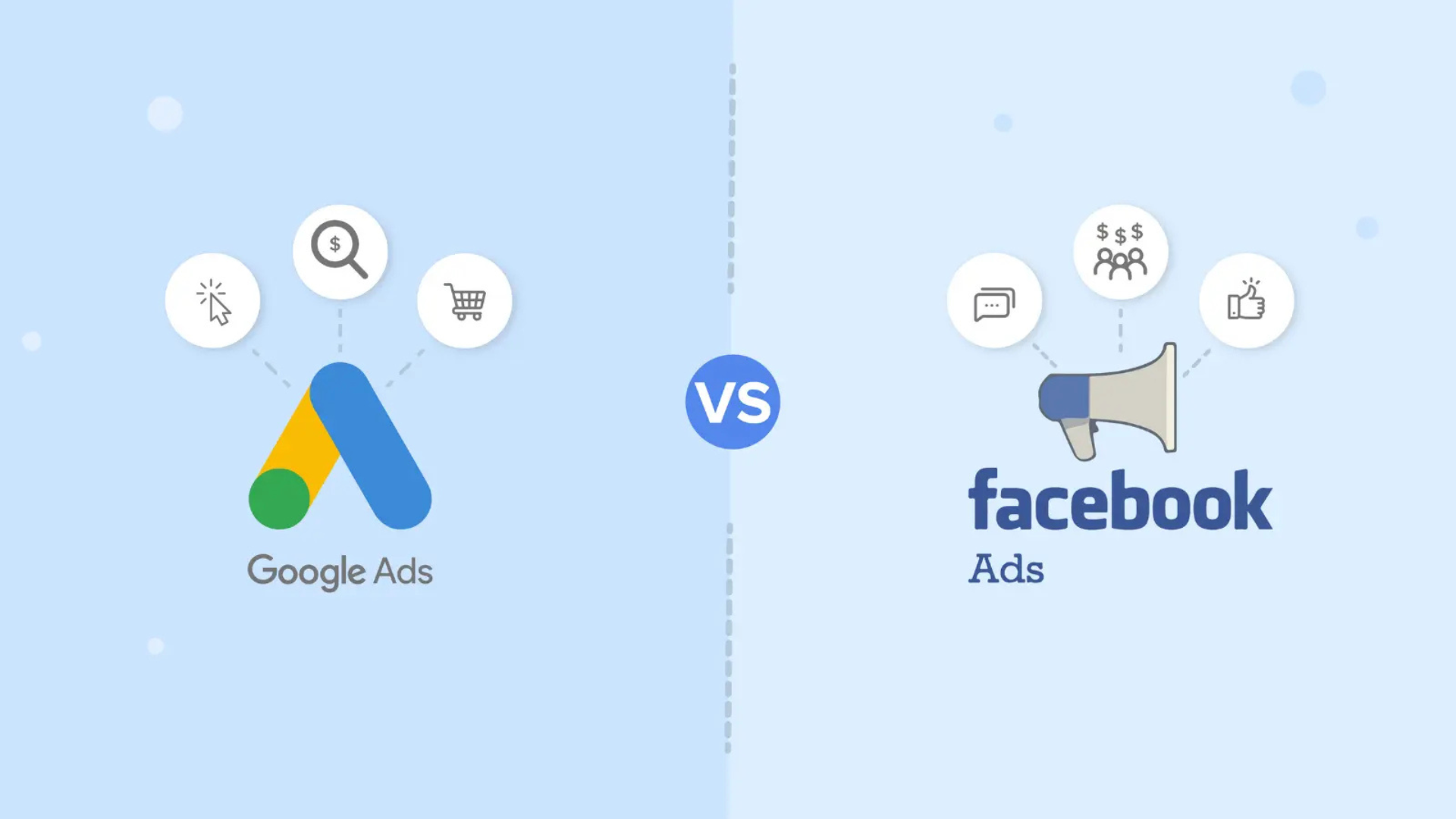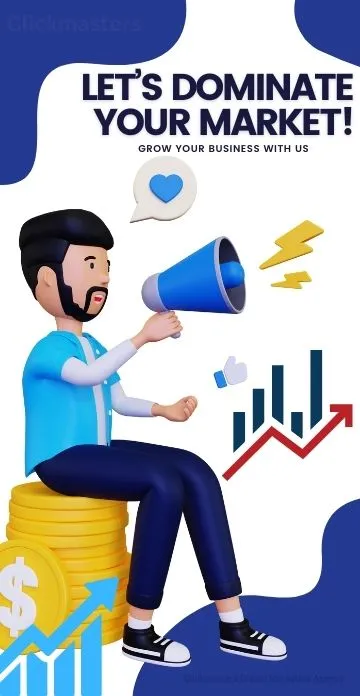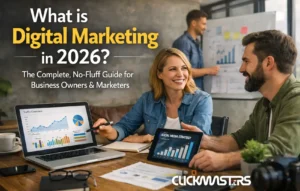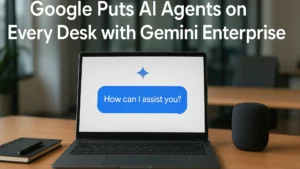In the world of marketing and business, Google Ads and Facebook Ads are the most important and efficient platforms for targeting new customers and diversifying your business. As of 2025, over 63% of global businesses use some form of digital advertising, and spending on digital ads is reaching approximately $720 billion.
Google Ads and Facebook Ads remain the top two platforms by market share. But there is still confusion: which one is better for your business, and which one can you trust because, after all, it impacts all of your business. The answer depends on your business objectives, target audience, and your business blueprints. In this blog post, we’ll evaluate Google Ads and Facebook Ads to decide which platform suits your business best.
What are Google Ads?
Google Ads(formerly Google AdWords) is a pay-per-click (PPC) advertising platform that displays ads on Google’s search engine results pages (SERPs), YouTube, and websites.
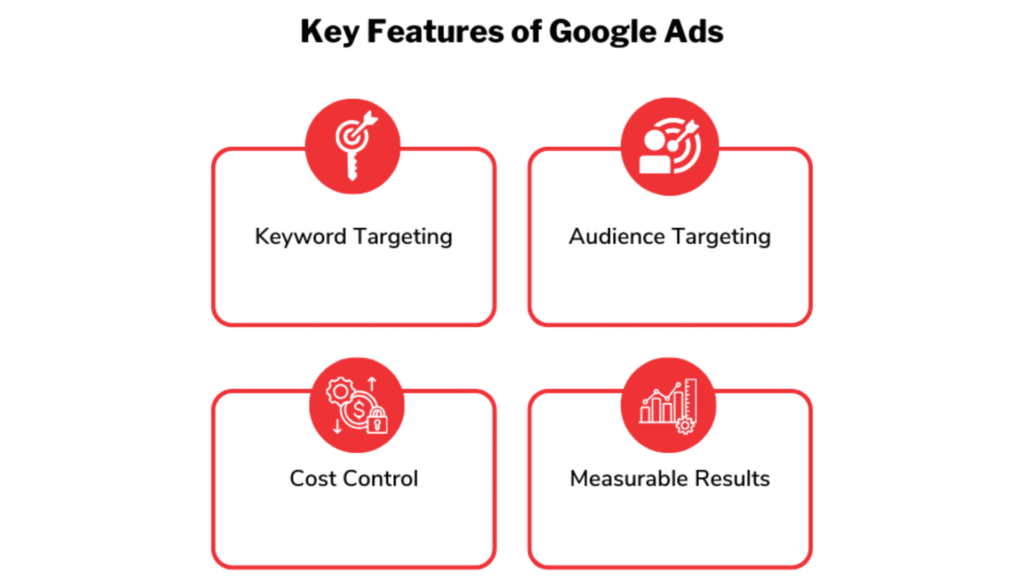
Key features of Google Ads:
- Keyword targeting: The targeted relevant keywords help the customers to match their queries.
- Google Ads reach: Google processes 8.5 billion searches per day, making it the largest search engine in the world. Advertisers can average $2 for every $1 spent on Google ads.
- Global reach: Google has billions of users. Google Ads will help your business reach a wide range of customers.
- Different Ad Structures: Google has different ad structures, including search ads, display ads, video ads, shopping ads, YouTube ads, and more.
- Search intent target: Ads are shown to users searching for products or services.
What are Facebook Ads?
Facebook Ads is a paid platform that helps businesses run promotional ads on Instagram, Facebook, Messenger, and the Audience Network. Facebook Ads help businesses to spread awareness and promotions.
Key Features of Facebook Ads:
- Customer targeting: Facebook focuses on the target audience based on their interest, demographics, and behaviors.
- Facebook Ads Reach Facebook ( now under Meta) has over 3 billion monthly active users across all platforms (Facebook, Instagram, Messenger), and 10 million advertisers use Facebook Ads.
- Visually appealing: Mostly, Facebook ads contain images, videos, and stories.
- Brand awareness and reaching: Facebook ads are mostly focused on brand awareness and reaching the targeted audiences.
- Retargeting Options: Have an option to easily retarget the audience once they interact with the content or product.
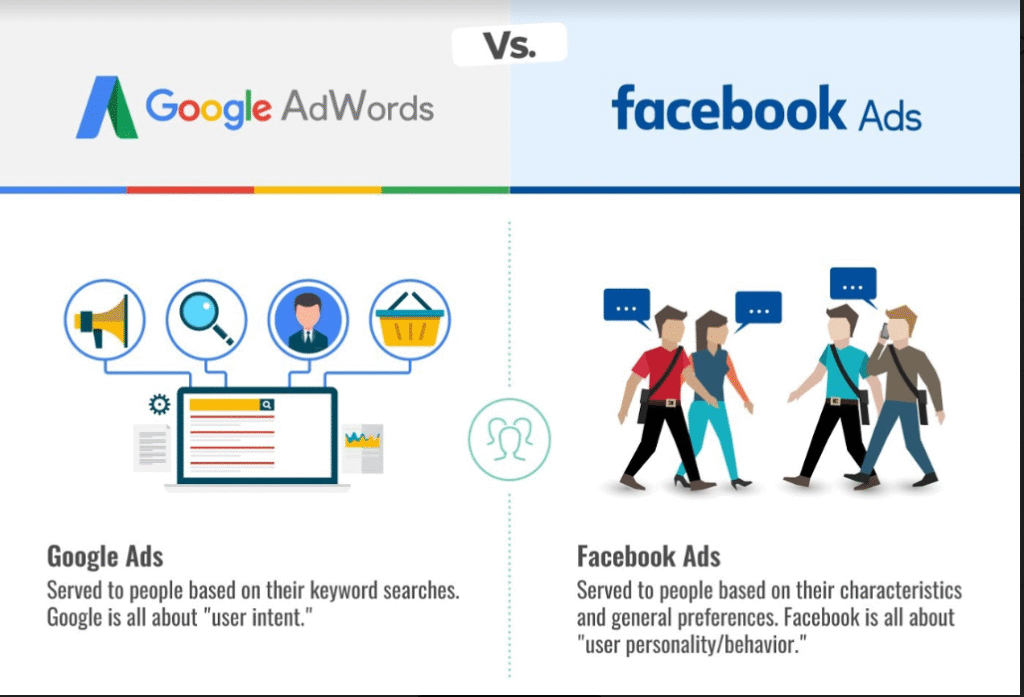
Google Ads vs. Facebook Ads: Head-to-Head Comparison
| Feature | Google Ads | Facebook Ads |
| User Intent | maximum (active users) | Minimum to medium(passive scrollers) |
| Ad template | Text, video, shopping, etc | Images, videos, stories, etc |
| Focusing | keywords, location, device. | Demographics, behaviors, and interests |
| Cost per click (CPC) | Greater (mostly in competitive niches) | Mostly less or medium |
| Conversation Type | Greater user intended | Brand awareness and promotions |
When to Use Google Ads?
Google Ads are best for:
- Businesses with greater user intent: If people actively search for your product (e.g., “Best makeup brand,” “Best clothing house”), Google Ads can drive high traffic..
- Online stores: Shopping ads allow customers to see your products on the search engine results page.
- Service-based business: Local service ads can help generate an in-service response
- Businesses with greater budgets: CPCs for competitive Niches may be expensive.
When to Use Facebook Ads?
Facebook Ads are very good for;
- Brand awareness and customer engagement: Very helpful for introducing new products and services. In short, it is very important for the promotion of your brand.
- Niche Focus: Target the audience on the basis of their interests, moods, and behaviors.
- Visual storytelling: Fashion, Food, Health, and sports may be the best for Facebook marketing.
- Retargeting: You can connect with website visitors through retargeting.
Can You Use Both Platforms?
Indeed, many businesses use both Google and Facebook ads to maximize their brand value and presence. Studies show that using both Google and Facebook Ads results in a 35% higher conversion rate compared to those who only use one platform.
For example:
- Use Google Ads to target high-intent searchers.
- Use Facebook Ads to spread brand awareness, which helps your business promote itself.
Which one is right for your business?
Here is a quick go-through:
Choose Google Ads:
- Your product has high product search intent.
- You want fast ROI.
- Targeting people who are ready to buy.
Choose Facebook Ads
- If you want to spread awareness about your brand and want a social presence.
- You have visually appealing products.
- If you are targeting a specific group of people.
Final Thoughts
Both Google Ads and Facebook Ads offer the best services according to the specifications of your business, audience, and products.
If you’re just starting and want to grow and want both customers’ trust and growth in your business, use a hybrid approach. Sometimes using both platforms gives you the best results.
Frequently Asked Questions (FAQs)
1. Which is better, Google Ads or Facebook Ads?
It depends on your goals. Google Ads works well for capturing high-intent traffic from users searching for your products or services. Facebook Ads are more effective for raising brand awareness, targeting specific groups, and engaging users with visual content.
2. Are Facebook Ads cheaper than Google Ads?
In many cases, yes. Facebook Ads usually have a lower cost-per-click (CPC) than Google Ads. However, Google Ads may attract higher-quality leads since the audience has a greater intent to buy.
3. Can I use both Facebook Ads and Google Ads at the same time?
Yes, and it’s often recommended. Using both platforms helps you reach users at different stages of the marketing funnel. Use Google Ads for search intent and conversions, and Facebook Ads for awareness and retargeting.
4. Do Facebook Ads or Google Ads perform better for e-commerce?
Both can be effective. Google Shopping Ads are great for displaying product listings directly in search results, while Facebook and Instagram Ads can present products visually and support dynamic retargeting campaigns.
5. Which platform is better for lead generation?
Google Ads generally generates higher-intent leads because users are actively searching. However, Facebook Ads can effectively gather leads through lead forms, messenger ads, and retargeting campaigns.
6. How much should I spend on Google Ads or Facebook Ads?
There’s no single answer. Start with a daily budget of $10 to $50, depending on your business size, and test for 1 to 2 weeks. Monitor performance and adjust based on ROI, CPC, and conversion rates.
7. Which platform offers better audience targeting?
Facebook Ads provides more detailed audience targeting based on interests, behaviors, and life events. Google Ads focuses on intent-based targeting through keywords and search queries.
8. Do I need a website to run Google or Facebook Ads?
A website is highly recommended for both platforms. However, with Facebook lead forms and Google Local Services Ads, you can collect leads without a complete website, though results are often better if you have one.

